#autoclaved aerated concrete block
Explore tagged Tumblr posts
Text
BUILD ECO AAC BLOCKS IS THE PERFECT PARTNER FOR MODERN CONSTRUCTION
Ready to take your construction projects to the next level? Partner with us and experience the unparalleled advantages of AAC blocks. Let’s build a stronger, more sustainable future together.

Why Choose AAC Blocks?
1. Eco-Friendly and Sustainable: Made from natural raw materials, AAC blocks are an environmentally friendly choice. They reduce waste, lower energy consumption during production, and offer excellent insulation, leading to significant energy savings in buildings.
2. Lightweight yet Strong: Despite their lightweight nature, AAC blocks are incredibly strong and durable. They are easy to handle, which speeds up construction and reduces labor costs, without compromising on strength and stability.
3. Excellent Insulation Properties: AAC blocks provide superior thermal and acoustic insulation. This means more comfortable living spaces, reduced heating and cooling costs, and a quieter, more serene environment.
4. Fire and Pest Resistant: Safety is paramount in construction. AAC blocks are non-combustible and provide excellent fire resistance, giving you peace of mind. Additionally, their inorganic composition makes them resistant to pests, such as termites.
5. Precision and Versatility: The precision and uniformity of AAC blocks ensure minimal on-site wastage and seamless integration into various construction projects, from residential homes to commercial buildings.
The Modern Builder's Choice
Incorporating AAC blocks into your construction projects is a forward-thinking choice that aligns with the demands of modern construction. Whether you are an architect, builder, or homeowner, AAC blocks offer a multitude of benefits that meet the high standards of today's building requirements.
If you’re looking for AAC Blocks, then look no further than Build Eco AAC Blocks – the best AAC blocks manufacturer. Contact Now!
#aac blocks#aac bricks#autoclaved aerated concrete block#flyash bricks#lightweight aac blocks#concrete blocks#concrete bricks#lightweight blocks#lightweight bricks#builders
0 notes
Text

If you want to build a house while being environmentally conscious, AAC blocks are the way to go. Autoclaved Aerated Concrete (AAC) is a certified green building material that is lightweight, load-bearing, high-insulating, durable, and three times lighter than red bricks.
0 notes
Text

Best AAC Blocks and Bricks Suppliers and Manufacturers in Hyderabad, Vijayawada, Bangalore, Vishakhapatnam, Chennai. Greenstone AAC Blocks Providers.
#autoclaved aerated concrete block manufacturers in visakhapatnam#autoclaved aerated concrete brick suppliers in visakhapatnam#autoclaved aerated concrete block suppliers in bangalore#autoclaved aerated concrete brick manufacturers in bangalore#autoclaved aerated concrete block manufacturers in chennai#autoclaved aerated concrete block suppliers in chennai#autoclaved aerated concrete brick manufacturers in chennai#autoclaved aerated concrete block suppliers in hyderabad
0 notes
Text
AAC blocks, also known as Autoclaved Aerated Concrete blocks, are lightweight, precast building materials used in construction. These blocks are made from a mixture of sand, fly ash (a waste product from coal combustion), cement, lime, and water. The mixture is poured into molds and then cured under pressure using an autoclaving process, which involves steam curing.
#aac blocks#aac bricks#aac blocks manufacturers#aac panels#bricks suppliers#aac block manufacturers#modcrete aac blocks#modcrete aac blox#aac block#aac
3 notes
·
View notes
Text
Concrete Blocks - Manufacturing, Classification & Uses
Concrete blocks are nowadays replacing bricks in masonry construction, notably in many multi-storeyed buildings. They are available in three types namely solid, hollow and cellular, widely used for the construction of filler walls and boundary walls in RC framework.
Concrete blocks are usually made in large sizes to make blockwork faster and consume less cement in joints than the brickwork. If the percentage of the voids is more than 25%, then they are hollow blocks and blocks with voids less than 25% are only perforated blocks.
The cellular concrete blocks are generally referred to as lightweight aerated concrete blocks. All these blocks are extensively used for compound walls and non-loadbearing walls.
Hollow blocks are specially made for loadbearing walls, which are useful in reducing a dead load of masonry in buildings. Blocks can also be with cement and sand called cement-sand blocks or with cement and soil called soil-cement blocks which are of low strength and use for low-cost construction.
Manufacturing of Concrete Blocks
BIS recommends a fineness modulus of the combined aggregate between 3.6 to 4 and coarse aggregates used are of size 6 to 12 mm. Lean mixes up to 1:8 are generally used. Concrete mix for concrete blocks should not be richer than one part of the cement to six parts of the volume of combined aggregate.
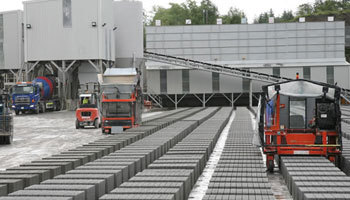
Concrete blocks can be handmade and also machine-made. The cast block is then cured in a water tank or yard for at least 14 days (water need to be changed at least every 4 days).
After curing, the blocks are dried for 4 weeks before being used in masonry construction. They should be stacked with voids in the horizontal direction to facilitate easy drying, or they should be steam cured and dried.
The whole process allows the complete shrinkage of the block to take place they are laid on the wall, which is very important for strong walls.
Classification of Concrete Blocks
Hollow concrete blocks
Open and Closed cavity-type hollow concrete blocks are classified into three grades:
Grade A - They possess a minimum density of 1500 kg/m³ and are used for load-bearing walls.
Grade B - They have a density below 1500 kg/m¬³ and used for load-bearing walls.
Grade C - These blocks are used for non-load bearing walls and have density more than 1000 kg/m³.
All these blocks are available in decorative facings like fluted facing to provide artistic effects.
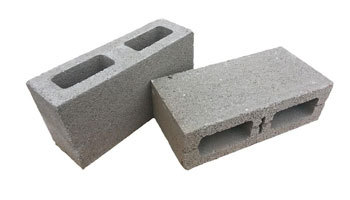
Solid concrete blocks
They should be manufactured for specific concrete strength of 4.0 and 5.0 N/mm² in 28 days. These blocks are used as load-bearing walls and have a density of not less than 1800 kg/m³.
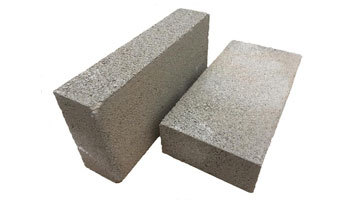
Paver blocks
These blocks are solid concrete blocks of different shapes specially made for exterior ground paving on sidewalks, parking lots, driveways, petrol pumps, industrial floors, etc.
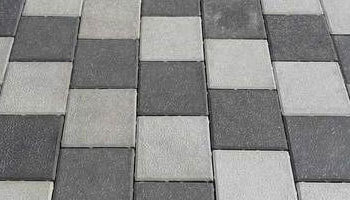
AAC Blocks
AAC blocks refer as Autoclaved Aerated Concrete Blocks. These blocks are also termed as light-weight hollow blocks.
They are prepared as solid blocks from cement, water and materials like ground sand, pulverized fly ash together with additives to aerate and stabilize the air bubbles.
The final result is a mixture of thick liquid which is then poured into steel moulds to form large cakes. After some time, the mixture sets and ready to cut into a serious of individual blocks of required size using taut steel wires.

Very light blocks for partition and moderate-weight blocks for light loadbearing walls can be obtained from aac blocks. These blocks do not shrink on drying as the material is obtained by autoclaving.
The autoclaved cement product is crystalline, which is different from the product obtained by normal wet curing or by ordinary steam curing.
Sizes and Tolerances
The nominal dimensions of concrete block as per BIS are as follows:
Length - 600, 500, 450 or 400 mm
Height - 100 or 200 mm
Width - 50, 75, 100, 150, 200, 250 or 300 mm
Actual sizes will be less than 10 mm of mortar thickness. For Concrete and Hollow concrete blocks nominal length 390 mm and height 190 mm. The thickness for loadbearing walls is 190 mm, compound walls 140 mm and for filler walls 90 mm.
These dimensions can easily be achieved in machine-made blocks than handmade blocks. The width of blocks use for load-bearing walls is 200 mm and for parapet or filler walls is 100 mm.
Points to Remember:
The mortar strength should not be more than the strength of the blocks. With high mortar strength, cracks will be less and very large, but with low mortar strength, cracks will be small and distributed.
We should use only blocks that are cured properly for at least 14 days and dried for 4 weeks to avoid shrinkage during construction.
We should not wet the blocks while placing in masonry construction.
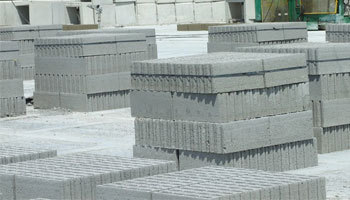
Freshly-made and uncured concrete blocks should never be allowed on the work.
Blockwork, particularly ordinary cement sand blocks and soil-cement blocks should not be used as loadbearing walls for concrete slab roof which favours to expand and contract with temperature.
The maximum difference in sizes allowed is ±5 mm in length and ±3 mm in height and width.
They should be protected from rains while being stored as they absorb moisture by wetting and shrinking on drying.
The main disadvantage of concrete blocks is shrinkage due to the movement of moisture content which is not present in bricks. As these blocks are much larger than bricks, any foundation movement will cause blockwork to crack more than the brickwork.
Cement blocks, Concrete blocks, Hollow concrete blocks, solid concrete blocks, Paver blocks, AAC blocks Concrete blocks in Hyderabad
#aac Blocks#aac blocks online#aac block size#Cement blocks#Concrete blocks#Hollow concrete blocks#solid concrete blocks#Paver blocks#AAC blocks
2 notes
·
View notes
Text

There are four major verticals in our company. The coatings division manufactures putties, textures & paints; Window doors division deals with Colour Coated Steel (CCGI) doors and windows, uPVC windows & doors, ABS doors and premium aluminium doors and windows. Walls division manufactures Autoclaved Aerated Concrete (AAC) blocks, dry-mix mortars and tile adhesives. We also have a dedicated service division, that handles the installation of doors and windows and painting works. We are providing a wide range of eco-friendly building materials and we provide end to end solutions.
2 notes
·
View notes
Text
0 notes
Text
Solid Block Manufacturers in Chennai: Building Strong Foundations

When it comes to modern construction, solid block manufacturers in Chennai are leading the way in providing durable and sustainable building materials. Solid blocks are a vital component of robust structures, offering exceptional strength and longevity while being environmentally friendly. With rapid urbanization, Chennai has witnessed a surge in the demand for high-quality solid blocks, prompting manufacturers to innovate and meet diverse needs.
Advantages of Solid Blocks
Durability: Solid blocks have high compressive strength, making them ideal for load-bearing structures.
Eco-Friendly: Made with fewer natural resources, solid blocks are a sustainable choice for environmentally conscious builders.
Sound Insulation: They offer excellent acoustic properties, reducing noise transmission.
Energy Efficiency: Solid blocks are great at thermal insulation, keeping interiors cooler in Chennai's hot climate.
Cost-Effectiveness: Reduced maintenance and long-lasting performance make solid blocks a cost-effective building material.
Top Solid Block Manufacturers in Chennai
Here are some reputed manufacturers providing solid blocks in Chennai:
Ultratech Cement ProductsKnown for their premium-quality concrete blocks, they cater to large-scale construction projects across the city.
KCP ReadymixTheir solid blocks are made from high-grade materials, ensuring consistency and strength.
AVS BlocksSpecializing in AAC (Autoclaved Aerated Concrete) and solid blocks, AVS delivers eco-friendly products.
SupermixWith a strong market presence, Supermix is a reliable name for construction materials in Chennai.
MVS Concrete ProductsOffering a variety of concrete blocks, MVS is known for its timely delivery and adherence to quality standards.
Hollow Bricks Manufacturers in Chennai
As the need for sustainable construction grows, hollow bricks are becoming a popular choice. They are lightweight, cost-efficient, and provide better thermal insulation than traditional bricks. Hollow bricks have hollow cavities that make them less dense, reducing the weight of structures without compromising on strength.
Benefits of Hollow Bricks
Lightweight Construction: Reduces the dead load on structures.
Thermal Efficiency: Keeps buildings cooler and reduces energy consumption.
Cost-Effective: Minimizes material usage without sacrificing structural integrity.
Sound Insulation: Offers better acoustic properties than standard bricks.
Environmentally Friendly: Made from natural and recycled materials.
Trusted Hollow Brick Manufacturers in Chennai
Eco Green BricksSpecializing in sustainable hollow bricks, Eco Green is a pioneer in eco-friendly construction solutions.
BuildmateRenowned for their automated brick manufacturing, Buildmate offers precision-engineered hollow bricks.
Durapact AAC BricksThey manufacture high-quality lightweight hollow bricks ideal for modern construction needs.
Periyar Concrete BlocksA trusted name in Chennai, they offer customizable hollow bricks for diverse projects.
JSW Cement BlocksKnown for innovation, JSW's hollow bricks combine durability with eco-consciousness.
Conclusion
For construction projects in Chennai, whether you’re looking for solid block manufacturers or hollow brick manufacturers, the city has a wealth of reliable options. Solid blocks are perfect for robust, load-bearing structures, while hollow bricks provide a sustainable and lightweight solution for modern construction. Builders can choose the material that best fits their project’s requirements, ensuring a balance of quality, cost-efficiency, and sustainability.
If you're planning your next construction project, explore these options to find the best manufacturers for solid blocks and hollow bricks manufacturer in Chennai to lay the foundation for success!
0 notes
Text
The ALC Block Manufacturing Process: A Comprehensive Guide
The ALC block manufacturing process is a sophisticated yet streamlined method for producing high-quality, lightweight construction materials. Essarcon, a pioneer in this industry, leverages advanced technology to ensure precision and efficiency in every step. Here’s a detailed look into the process.

Raw Material Selection
The journey begins with selecting high-quality raw materials, which include:
Ordinary Portland Cement
Quicklime
Gypsum
Fly Ash or Fine Sand
Aluminum Powder
Water
Careful selection and proportioning of these materials are critical, as they determine the strength, weight, and thermal properties of the final product.
2. Mixing
In the ALC block manufacturing process, the raw materials are mixed in a specially designed batching system. The addition of aluminum powder creates a chemical reaction, releasing hydrogen gas. This reaction forms tiny, uniform air bubbles, giving ALC blocks their characteristic lightweight and insulating properties.
3. Molding and Pre-curing
The aerated mixture is poured into molds to form large cakes. These molds undergo pre-curing at ambient temperature, allowing the hydrogen bubbles to stabilize within the slurry. This step is essential in the ALC block manufacturing process, as it establishes the blocks’ cellular structure.
4. Cutting
Once pre-cured, the cakes are precisely cut into blocks of the required dimensions using advanced cutting machines. The cutting process ensures minimal waste while achieving consistent sizes, a key factor in efficient construction.
5. Natural Curing
Unlike autoclaved aerated concrete (AAC), the ALC block manufacturing process employs natural curing methods. The blocks gain strength over time under natural conditions, eliminating the need for high-pressure steam curing. This makes the process cost-effective and suitable for smaller production facilities.
Advantages of ALC Blocks
The ALC block manufacturing process results in products that offer:
Lightweight construction, reducing load on the foundation
Superior thermal insulation, reducing energy costs
Soundproofing, enhancing living comfort
Eco-friendly production, with reduced energy consumption
Essarcon’s expertise in the ALC block manufacturing process ensures that clients receive top-notch machinery and guidance to produce blocks that meet market demands. With over 14 years of experience, Essarcon is your trusted partner for innovative, sustainable construction solutions. For more details on ALC Block Manufacturing Process visit Essarcon’s official page on ALC Block Manufacturing Process.
#business#alc block#alc block plant#alc plant#alc plant setup#alc block plant setup#alc#manufacturer
0 notes
Text
BUILDING SAFETY: HOW AAC BLOCKS STAND STRONG AGAINST FIRE?
Build ECO AAC Blocks: The Ultimate Shield Against Fire
When it comes to building materials, safety and durability are paramount. Autoclaved Aerated Concrete (AAC) blocks are leading the charge with their superior fire resistance, making them an ideal choice for constructing fire-safe buildings. Here's why AAC blocks stand strong against fire:

1. Non-combustible Composition
AAC blocks are made from a blend of natural materials like sand, cement, lime, and water, which are non-combustible. This inherent property ensures that the blocks do not contribute to the spread of fire.
2. High Fire Rating
AAC blocks can withstand temperatures of up to 1600°F (870°C), far exceeding the typical temperatures of house fires. They offer a fire rating of up to four hours, providing crucial time for occupants to evacuate and for fire-fighters to respond.
3. Thermal Insulation
The cellular structure of AAC blocks provides excellent thermal insulation. This means that even during a fire, the heat penetration through the blocks is significantly slowed down, protecting the structure and its occupants from the intense heat.
4. Reduced Smoke and Toxic Gas Emissions
In the event of a fire, AAC blocks do not emit toxic gases or smoke, which are major contributors to casualties in fires. This makes them a safer option compared to other materials that might release harmful substances when burning.
5. Structural Integrity
AAC blocks maintain their structural integrity even under extreme heat. They do not crack or spall, which helps in preventing the collapse of the building during a fire, thereby providing additional safety.
6. Lightweight yet Strong
Despite being lightweight, AAC blocks are robust and durable. Their unique manufacturing process gives them high strength, allowing them to support significant loads while still being resistant to fire damage.
Choosing AAC blocks for your construction project is not just a choice for sustainability and efficiency, but also a proactive step towards ensuring safety. Their exceptional fire resistance properties make them a reliable material in protecting lives and property from the devastating effects of fire. When it comes to building with safety in mind, AAC blocks are a fortress against flames.
#aac blocks#aac bricks#autoclaved aerated concrete block#flyash bricks#concrete blocks#lightweight aac blocks#concrete bricks#lightweight blocks#lightweight bricks#builders
0 notes
Text
The AAC Block Plant Manufacturing Unit
In the quest for sustainable and efficient building materials, Autoclaved Aerated Concrete (AAC) blocks have emerged as a preferred choice across the globe. With their lightweight nature, excellent thermal insulation, and eco-friendly properties, AAC blocks are transforming the construction landscape. At the heart of this revolution are AAC block plant manufacturing units, which play a crucial role in producing these innovative materials. This article explores the significance of AAC block plants, their manufacturing processes, benefits, and their impact on the construction industry.

What Are AAC Blocks?
AAC blocks are precast, lightweight concrete blocks made from a mixture of cement, lime, water, and an expanding agent, usually aluminum powder. This combination undergoes a unique curing process in an autoclave, which gives AAC blocks their distinctive properties, such as superior insulation, fire resistance, and soundproofing. These blocks are ideal for various applications, including residential buildings, commercial complexes, and industrial structures.
The Structure of an AAC Block Plant Manufacturing Unit
An AAC block plant is designed to automate the production of AAC blocks, ensuring efficiency and quality. Key components of an AAC block manufacturing unit include:
Raw Material StorageThe plant begins with storage facilities for essential raw materials, including cement, lime, fly ash, water, and aluminum powder. Proper storage ensures material quality and easy access during production.
Mixing StationIn this phase, the raw materials are carefully measured and mixed to create a homogeneous slurry. The mixing station is critical for achieving the desired properties of the AAC blocks.
Molding SystemThe mixed slurry is poured into molds to shape the blocks. Automated molding systems enhance precision and consistency, producing uniform blocks that meet construction standards.
Cutting EquipmentAfter the blocks are formed, they are cut to specific dimensions using specialized cutting machines. This step ensures that each block is uniform in size, which is crucial for effective construction.
Curing ChamberThe blocks are then placed in an autoclave for high-pressure steam curing. This process not only strengthens the blocks but also enhances their thermal and fire-resistant properties.
Finishing and PackagingOnce cured, the blocks undergo finishing processes, which may include trimming and surface treatment. Finally, the blocks are packaged for transportation, ready to be delivered to construction sites.
Advantages of AAC Block Plant Manufacturing Units
High EfficiencyAutomated processes within AAC block plants significantly increase production capacity, enabling manufacturers to meet the rising demand for AAC blocks in the construction sector.
Quality ControlThe integration of advanced technology ensures that each stage of production adheres to stringent quality standards. Consistency in size, shape, and strength is maintained, which is essential for structural integrity.
Cost-EffectivenessThe lightweight nature of AAC blocks translates to lower transportation costs and reduced labor expenses during installation. Additionally, the energy efficiency of buildings constructed with AAC blocks leads to long-term savings.
Versatile ApplicationsThe versatility of AAC blocks allows them to be used in a variety of applications, from residential homes to commercial buildings and industrial facilities. This adaptability enhances the market potential for AAC block plants.
The Impact on the Construction Industry
As the construction industry in India and worldwide shifts towards sustainable practices, AAC block manufacturing units are becoming increasingly important. Government initiatives promoting green building materials and energy-efficient construction methods are driving the adoption of AAC blocks.
With urbanization on the rise, the demand for efficient building solutions is escalating. AAC block plants are positioned to meet this demand, providing high-quality, eco-friendly materials that align with contemporary construction standards.
Conclusion
The establishment of AAC block plant manufacturing units represents a significant advancement in the construction industry, offering a sustainable, efficient, and high-quality alternative to traditional building materials. As AAC blocks gain traction for their numerous benefits, these manufacturing units are set to play a pivotal role in shaping the future of construction. By harnessing innovative technology and eco-friendly practices, AAC block plants are not just responding to current market demands they are paving the way for a more sustainable and resilient built environment.
0 notes
Text
Innovations in Autoclaved Aerated Concrete Block Manufacturing
In the rapidly evolving world of construction, Autoclaved Aerated Concrete (AAC) blocks in bangalore have emerged as a revolutionary building material. AAC blocks are known for their sustainability, energy efficiency, and versatile applications in construction projects. In this Prime AAC Blocks, we will explore the innovations and advancements in AAC block manufacturing, as well as the vital roles played by suppliers, dealers, and traders in the industry.
Understanding Autoclaved Aerated Concrete Blocks
Before delving into innovations, let's briefly recap what makes AAC blocks so special. Autoclaved aerated concrete block manufacturers in Tirupati, precast, and eco-friendly construction elements. They are created through a unique manufacturing process involving aerating concrete with aluminum powder, resulting in a porous structure that offers exceptional insulation properties.
Innovations in AAC Block Manufacturing
Modern AAC block manufacturing plants are equipped with cutting-edge technology that allows for faster production while maintaining high quality.
Automation and robotics are increasingly being employed to streamline processes, reducing human error and labor costs.
Advanced Raw Materials
Manufacturers are continuously researching and experimenting with alternative raw materials to improve the properties of autoclaved aerated concrete block suppliers in Tamil Nadu. Innovations in raw material sourcing aim to enhance sustainability and reduce environmental impact.
Manufacturers are now offering a wider range of AAC block sizes and shapes, allowing for greater design flexibility in construction projects. Customized textures and finishes are becoming popular, enhancing the aesthetic appeal of AAC block buildings.
Innovations in autoclave technology have led to more energy-efficient curing processes, reducing the carbon footprint of AAC block production. Solar-powered autoclaves are being explored to further enhance sustainability. The Crucial Role of AAC Block Suppliers, Dealers, and Traders
AAC block suppliers play a critical role in ensuring a steady flow of materials to meet growing demand.
Collaboration with manufacturers for just-in-time deliveries is becoming essential to minimize inventory costs. Dealers and traders act as intermediaries connecting manufacturers with local construction projects. They provide on-the-ground expertise and support to builders and contractors.
Innovations in Autoclaved Aerated Concrete block manufacturing are driving sustainability, efficiency, and versatility in the construction industry. Manufacturers are continuously pushing the boundaries of what autoclaved aerated concrete block dealers in Hyderabad can offer, while suppliers, dealers, and traders play pivotal roles in ensuring these innovative building materials reach construction sites worldwide. As the construction sector embraces green and sustainable practices, AAC blocks and their ecosystem of stakeholders will undoubtedly play a central role in shaping the future of construction.
#autoclaved aerated concrete block dealers in hyderabad#autoclaved aerated concrete block traders in hyderabad#autoclaved aerated concrete block manufacturers in anantapur#autoclaved aerated concrete block suppliers in anantapur#autoclaved aerated concrete blocks manufacturers in tirupati#autoclaved aerated concrete blocks suppliers in tirupati#autoclaved aerated concrete block dealers in bangalore#autoclaved aerated concrete block traders in bangalore#autoclaved aerated concrete blocks manufacturers in bangalore#autoclaved aerated concrete blocks manufacturers in tamil nadu#autoclaved aerated concrete blocks suppliers in tamil nadu#autoclaved aerated concrete blocks dealers in tamil nadu
0 notes
Text

Conecc Concrete Solutions Pvt Ltd. is the leading manufacturer of Autoclaved Aerated Concrete (AAC) blocks in Karnataka. Conecc Concrete Solutions https://coneccconcrete.com/
0 notes
Text
In the realm of modern construction, innovative building materials have revolutionized the way we construct sustainable and energy-efficient structures. One such groundbreaking material is Autoclaved Aerated Concrete (AAC) blocks. AAC blocks have garnered significant attention and adoption in recent years due to their remarkable properties and environmental benefits. This blog aims to delve into the world of AAC blocks, exploring their composition, advantages, and the positive impact they have on the construction industry and the environment.
#aac blocks#aac bricks#aac blocks manufacturers#aac panels#bricks suppliers#aac block manufacturers#modcrete aac blocks#modcrete aac blox#aac block
2 notes
·
View notes
Text
Best in Quality Autoclaved Aerated Concrete, AAC Blocks & Bricks Manufacturers, Suppliers in Hyderabad, Vijayawada, Bangalore, Visakhapatnam. Standard commercial aac blocks for construction
0 notes
Text
Leading AAC Block Manufacturers of Vadodara
Vallabh Group is a reputable name in Vadodara, specializing in the manufacturing of premium Autoclaved Aerated Concrete (AAC) blocks. Renowned for their strength, lightweight design, and eco-friendly characteristics, AAC blocks are rapidly becoming the preferred material for modern construction projects.
Why Choose AAC Blocks from Vallabh Group?
Durability and Strength: AAC blocks are celebrated for their exceptional durability and structural integrity. They offer excellent stability, making them suitable for both residential and commercial constructions.
Lightweight Advantage: Compared to traditional bricks, AAC blocks are significantly lighter, reducing the overall load on the building structure. This lightweight nature simplifies transportation and installation, ultimately saving time and labor costs.
Energy Efficiency: With outstanding insulation properties, AAC blocks help maintain comfortable indoor temperatures, keeping buildings cool in summer and warm in winter. This energy efficiency translates to lower heating and cooling costs over time.
Environmentally Friendly: Crafted from non-toxic materials, AAC blocks are a sustainable choice for construction. They are 100% recyclable, helping to minimize construction waste and support environmentally friendly building practices.
Fire and Insect Resistant: AAC blocks are non-flammable, offering enhanced fire resistance for structures. Additionally, their resistance to pests like termites ensures a longer lifespan for your buildings.

Versatile Applications of AAC Blocks
Vallabh Group's AAC blocks are adaptable for a variety of construction projects, including:
Residential Buildings: Ideal for home construction, AAC blocks provide both lightweight properties and excellent thermal insulation.
Commercial Buildings: From office spaces to retail outlets, AAC blocks deliver the strength and stability required for large-scale commercial projects.
Industrial Projects: Perfect for industrial structures and warehouses, AAC blocks offer cost-effective and sustainable solutions for sizable constructions.
Why Choose Vallabh Group?
With years of experience in the construction industry, Vallabh Group is committed to supplying high-quality AAC blocks that adhere to the highest industry standards. We guarantee timely delivery, expert guidance, and competitive pricing, making us the preferred choice for builders and contractors in Vadodara.
For all your AAC block needs, trust Vallabh Group to provide products that ensure the strength, safety, and durability of your construction projects. Contact us today for more information!
Name — Vallabh Group | Cement Dealers in Vadodara | AAC Block Manufacturers in Vadodara
Phone — 8866488848
Address — 4th floor, 402 Mishri House, Shraddhadip Society, Akota Garden Lane, Akota, Vadodara — 390020
0 notes